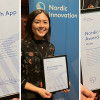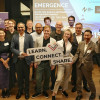With support from Nordic Innovation, Aarhus Municipality is leading a project to monitor their sleep patterns and improve their quality of life.
“People with dementia often experience sleep problems. They have disturbed circadian rhythm and can be found as they wander around their apartment in the middle of the night, drastically reducing their sleep quality. We have therefore identified sensor technology as a solution to the problem”, says Søren Holm Pallesen, Project Manager in the City of Aarhus.
Aarhus, Helsinki and Tórshavn are the three test cities in the project Sleep Monitoring. The project is part of the Nordic Healthy Cities initiative from the Nordic Smart City Network, which is co-funded by Nordic Innovation. In the long term, the goal is to develop solutions that improve the sleep quality of residents, while also enabling opportunities for commercialization of the technology used.

If we get the technology in place, the nurses will have completely different prerequisites for solving the problem. Our goal is to provide a better basis for decision making through data.
Søren Holm Pallesen, Project Manager, City of Aarhus
A better life for nursing home residents
As of today, it can take several hours before nurses discover out-of-bed residents at night, and sometimes they walk around undetected. This can naturally result in sleep deprived residents, with the nurses having little basis for knowing exactly why. New sensor technology enabling sleep monitoring will greatly reduce the response time.
“If we get the technology in place, the nurses will have completely different prerequisites for solving the problem. Our goal is to provide a better basis for decision making through data”, says Holm Pallesen.
He mentions several types of activity sensors that may be relevant for obtaining the necessary data.
“We can place a sensor in the bed to detect vibrations, which generates data on rotation frequency and sleep time. Another solution could be a smart blanket to generate data for out-of-bed frequency and sleep time. There are many possible solutions – our job is to find the right one.“
Less need for medication
Between 2018-2020, Aarhus, Esbjerg and Randers carried out a so-called «free-municipality -experiment», which means a project with exemption from legislation on monitoring individuals. This was done with the intention of collecting data about the target group. The project showed that increased focus on nursing home residents' sleep, leads to increased quality of care and nursing. Moreover, better circadian rhythms increase energy and functioning for residents.
“The nurses suddenly had completely different prerequisites for helping the residents. Where one previously had to provide residents with sleeping pills, the new insight has led to less medication and better care.“
Strict privacy rules
The main objective of the current project is to make use of the insight generated in the previous project and develop a solution that can solve the sleep quality challenges, while being compliant with privacy legislation and GDPR.
This winter, an innovation sprint will be arranged in Aarhus, where hardware and software companies in collaboration with partner cities and end users will try to develop a prototype for sleep monitoring. Throughout the spring, the prototype will be adjusted, and before the summer, the goal is to have a complete prototype ready.
“When the prototype is in place, we will test it in our partner cities. The goal is to develop technology that provides us with the necessary insight, while also being approved by authorities regarding storage of private data and monitoring of individuals. The insight generated from testing will be shared within the Nordic network.“




